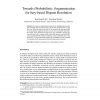Free Online Productivity Tools
i2Speak
i2Symbol
i2OCR
iTex2Img
iWeb2Print
iWeb2Shot
i2Type
iPdf2Split
iPdf2Merge
i2Bopomofo
i2Arabic
i2Style
i2Image
i2PDF
iLatex2Rtf
Sci2ools
145
click to vote
COMMA
2010
2010
Towards (Probabilistic) Argumentation for Jury-based Dispute Resolution
Abstract. We propose an argumentation framework for modelling jury-based dispute resolution where the dispute parties present their arguments before a judge and a jury. While the judge as the arbiter of law determines the legal permissibility of the presented arguments the jurors as triers of facts determine their probable weights. Such a framework is based on two key components: classical argumentation frameworks containing legally permissible arguments and probabilistic spaces assigning probable weights to arguments. A juror's probability space is represented by a set of possible worlds coupled with a probabilistic measure computed by assumption-based argumentation framework using grounded semantics. Keywords. Probabilistic argumentation, jury-based dispute resolution
Applied Computing | Argumentation Framework | COMMA 2010 | Jury-based Dispute Resolution | Probable Weights |
| Added | 14 May 2011 |
| Updated | 14 May 2011 |
| Type | Journal |
| Year | 2010 |
| Where | COMMA |
| Authors | Phan Minh Dung, Phan Minh Thang |
Comments (0)

